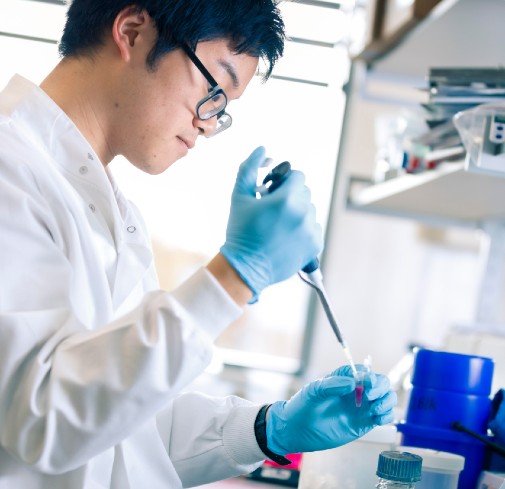Scientists join forces to address key unanswered questions about immunity and COVID-19
Posted on 28 August 2020
 Image credit: Hull York Medical School.
Image credit: Hull York Medical School.
The UK Coronavirus Immunology Consortium (UK-CIC) combines the expertise of scientists from 17 institutions including the University of York and will work to identify how the immune system responds to SARS-CoV-2 – the virus which causes COVID-19.
The research is critical to understanding the many unknowns around the novel virus – for example, why it makes some people sick and not others, what constitutes effective immunity and how long might that immunity last.
Rapid progress
To address the need for rapid and effective progress in our knowledge of COVID-19 and the immune system, the UK Coronavirus Immunology Consortium has received £6.5million of funding over 12 months from UK Research and Innovation (UKRI) and the National Institute for Health Research (NIHR). This represents the largest immunology grant awarded to tackle the COVID-19 pandemic.
UK-CIC aims to deliver meaningful benefits for public health by providing insights critical for improving patient care, developing new therapies, assessing immunity within the population and developing diagnostics and vaccines.
UK-CIC sets out to answer five key questions that will help the global coronavirus response:
- Why do people experience different symptoms from COVID-19 and what role does the immune system play in this?
- What constitutes immunity to COVID-19 and how long does it last?
- How does the immune system respond to SARS-CoV-2 on a molecular and cellular level and what happens when the immune system overreacts?
- Can infection with other mild coronaviruses (which cause the common cold) protect you from catching COVID-19 or will it make you more ill?
- How does SARS-CoV-2 hide from the immune system?
Working together
Paul Kaye, Professor of Immunology at Hull York Medical School at the University of York, said: “Our research team at York, together with colleagues in Cambridge, Cardiff and Newcastle, will be taking the lead on addressing the question of how our immune system contributes to the damage caused to different body organs after SARS-CoV-2 infection and whether treatments that modulate specific immune responses might therefore be beneficial. We will also be looking at the role the immune system plays in determining variation in susceptibility to primary infection with COVID-19 and how this varies across the life course.
“The coronavirus pandemic poses a global challenge of enormous magnitude and this nationally-coordinated effort will enable us to work together, harnessing technologies and expertise not available within a single institute, to bring about meaningful benefits for patients.”
The Consortium will collaborate closely with ISARIC-4C, an internationally-leading project already underway to examine the immune profile of hospitalised patients with COVID-19, and is supported by the British Society for Immunology.
Unprecedented
Professor Paul Moss, UK-CIC Principal Investigator of the Consortium from the University of Birmingham, said: “Understanding the complexities of the immune response to SARS-CoV-2 is key to successfully developing new diagnostics, treatments and vaccines against COVID-19. UK-CIC will see the UK immunology community come together in an unprecedented way to answer questions that are crucial in helping us control this pandemic, such as how effective immunity is developed and why individuals respond differently to the disease.
“Immunologists are at the forefront of efforts to tackle the coronavirus pandemic and the UK is a world-leader in immunology research. It’s an honour to lead this consortium to deliver a co-ordinated and agile national research programme to build our knowledge of this disease, which will translate into meaningful benefit for patients. There is so much that we still need to learn about how the novel coronavirus interacts with our immune system and, with this investment, we have a unique opportunity to answer these key questions and hasten effective pandemic control.”
Explore more news

Wolf protection downgrade highlights need for adaptive conservation frameworks, say experts
Thursday 18 September 2025

York Research maps 27 ways to fix the UK’s food system
Thursday 18 September 2025

York archaeologist to uncover forgotten stories of ageing
Tuesday 16 September 2025

Study reveals delayed marriage reduces obesity risk for urban women in Pakistan
Tuesday 16 September 2025

New study argues that modern plastics form an important archaeological record
Monday 15 September 2025
Media enquiries
About this research
UK-CIC is jointly funded by UKRI and NIHR as part of their rolling call for research proposals on COVID-19. It is supported by the British Society for Immunology. The aims of UK-CIC were developed from the research priorities on immunology and COVID-19 set out in May 2020 by the Academy of Medical Sciences and British Society for Immunology expert taskforce on immunology and COVID-19.
UK-CIC involves researchers from departments across the University of York, including Hull York Medical School, Maths and the Biosciences Technology Facility.
Explore more of our research.
